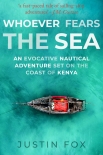Whoever Fears the Sea, Justin Fox [i love reading .TXT] 📗

- Author: Justin Fox
Book online «Whoever Fears the Sea, Justin Fox [i love reading .TXT] 📗». Author Justin Fox
Paul entered the guardroom. Its ceiling was fashioned from planks laid side by side; the edges had holes drilled in them and were stitched together with rope. Of course! He’d read somewhere that Fort Jesus housed the only surviving remains of a mtepe. He stared up at the dark beams, the intricate stitching that held them together, and marvelled at the ancient maritime engineering.
He left the guardroom and climbed the battlements. The walls were tall, ochre-coloured redoubts punctuated with musket slits and bristling with cannons. He stopped to peer through an embrasure above a secluded corner of the moat. Closing his eyes, he pictured the unfolding scene from three centuries ago. A young African woman was talking to a Portuguese soldier. His musket lay to one side and he’d undone his sword. She leant against the wall and hitched up her skirts to reveal large brown buttocks. The man let his breeches fall and pressed himself against her. With his knees he forced her legs wider and both bodies began to gyrate. They looked like some strange insect with two torsos and four legs. The white bottom bounced back and forth. Black arms were spread against the coral wall. The soldier yanked roughly at her blouse and two breasts fell out. After a few moments, there was a faint moan and the man pulled up his trousers, looked around furtively and handed her a small leather pouch.
Paul opened his eyes, shook his head and walked on. He found a stone seat where the walls were at their lowest and where the Omanis had finally breached the defences. Paul had watched enough war documentaries on the History Channel to have a fairly good idea of how it went: ragged musket fire, the occasional harrumph of a cannon, the shouting, smoke and chaos. He felt the fear: an enemy swarming over the walls like cockroaches and racing towards him, brandishing muskets and swords (pikes? scimitars? he’d better check); the bloodcurdling screams. There on the bastion, Paul could feel the axis of power shifting to the east.
Blood, blood and more blood was all he could think about.
A graffito on the wall opposite the fort read WESTOXICATION. He walked down to the water’s edge. The fort’s seaward defences overlooked a line of blossoming frangipani trees; beyond them, boys swam in clear blue water. Large ‘ship-breaker’ cannons and stubby carronades sat close to the water, protecting the narrow channel to the anchorage.
Outside Schmuck Laden Curio Shop, an American woman — leathery skin, khaki shorts, sneakers and backpack — asked him where he was from. She ignored his answer and got straight to the point, as though they’d already been conversing for some time.
The woman was from Santa Cruz, California. An older version of Hannah, thought Paul. The same searching eyes, the same hunger to be understood. Her name was Pamela and she was perfectly nice. The questions came thick and fast. What did Paul think of 9/11? What should America’s response be? What would Muslim Africa do if they bombed Afghanistan? Pamela had been ‘talking with the locals’, questioning, fact-finding, seeking approval for her president’s next move. It was as though she were on a PR mission from the White House.
‘America has a historic opportunity to improve its image in the world, to join the world!’ she said, touching Paul’s arm. ‘It’s a chance for us to really understand other nations, what with all the sympathy directed our way in the month since 9/11. We must seize this opportunity, don’t you think?’
Her attitude was something new to Paul. There was a vulnerability, a need to be understood, accepted, even in the back streets of Mombasa. It was as though the destruction of two towers had pricked a bubble in the same way Pearl Harbour had done. Paul liked what he was hearing.
They talked for a while on the pavement, Paul giving his cautious two cents’ worth, Pamela almost listening. Then, all of a sudden, she turned on her heel and trotted up the street, pumping her sneakers and looking for more sympathy for America.
Half a block further on, he overheard an argument taking place on a veranda. He’d stopped to take a picture of a carved wooden door and lingered for a moment of eavesdropping. The tiff was in Swahili, but the words ‘Osama’ and ‘Bush’ were unmistakeable. After a minute, the pair of arguers in flowing white kanzus stormed off in different directions: no common ground had been found. Paul felt war was close. He pictured a box of dynamite and a sizzling spark gliding along its fuse like a mamba through long grass.
He wandered deeper into the backstreets, where little appeared to have changed in centuries. There were diminutive mosques and darkened shops selling chests, fabrics, soapstone sculptures and carpets. Here was a living link to the slaves and ivory, hides and horns that passed through these streets long before the first Europeans set foot ashore.
Insistent salesmen talked the age-old talk of trade — extra-low price, only today, especially for you, your last chance, how much you think it’s worth, name a price, go on sir, name your price. So too, the insistent refrain of ‘Jambo!’ from passing men, offering to be his guide, to show him the secrets of the town. Less forthcoming were the women, often in head-to-toe buibuis. The sparkle of kohl-lined eyes from slits in their black robes; the glimpse of a gold bracelet, henna tattoo or dainty, sandal-strapped ankle. So sexy and so damned aloof, he thought.
Paul took





Comments (0)